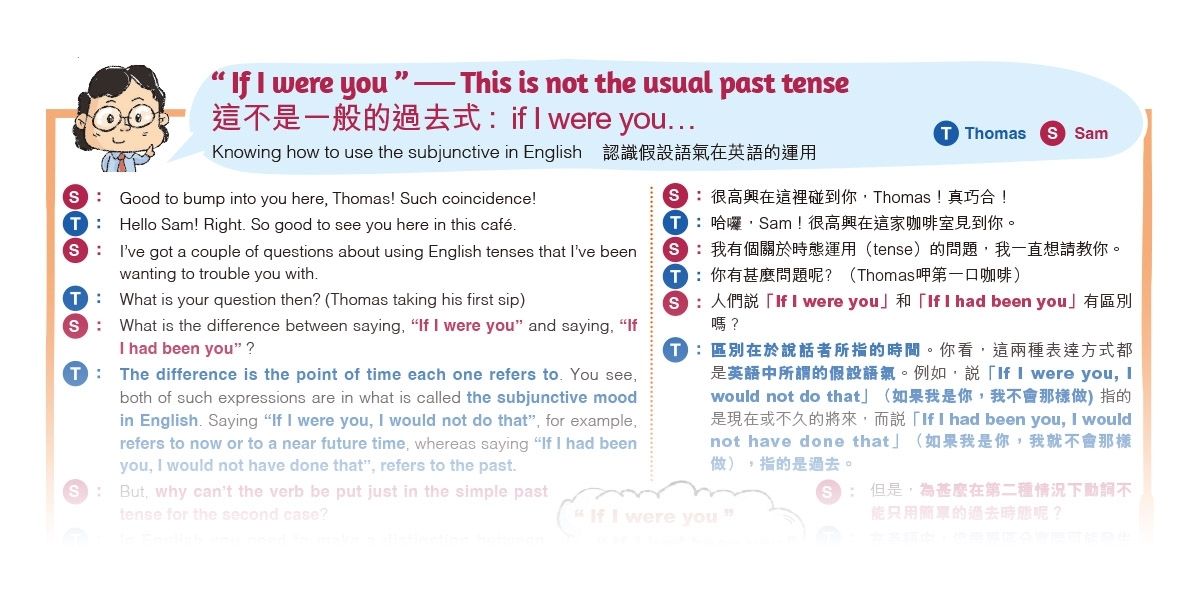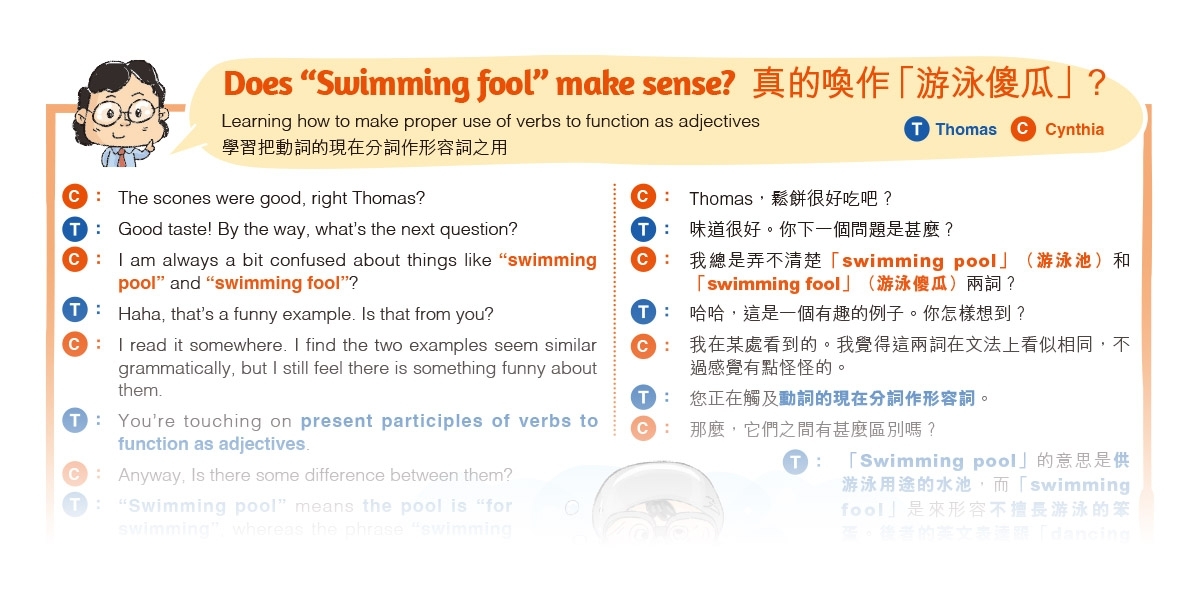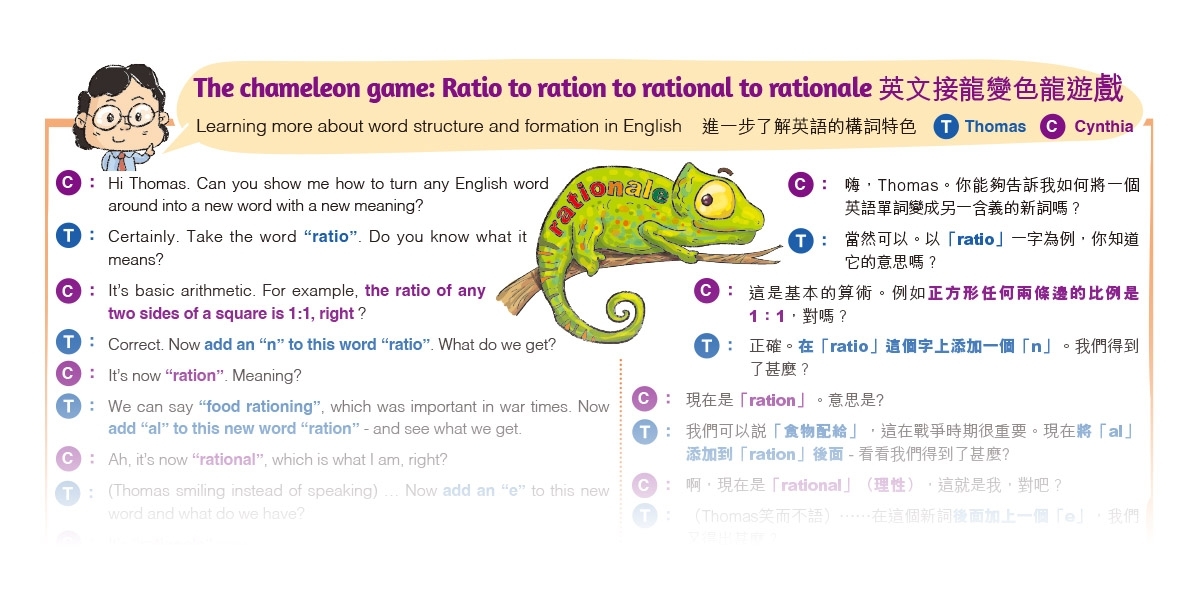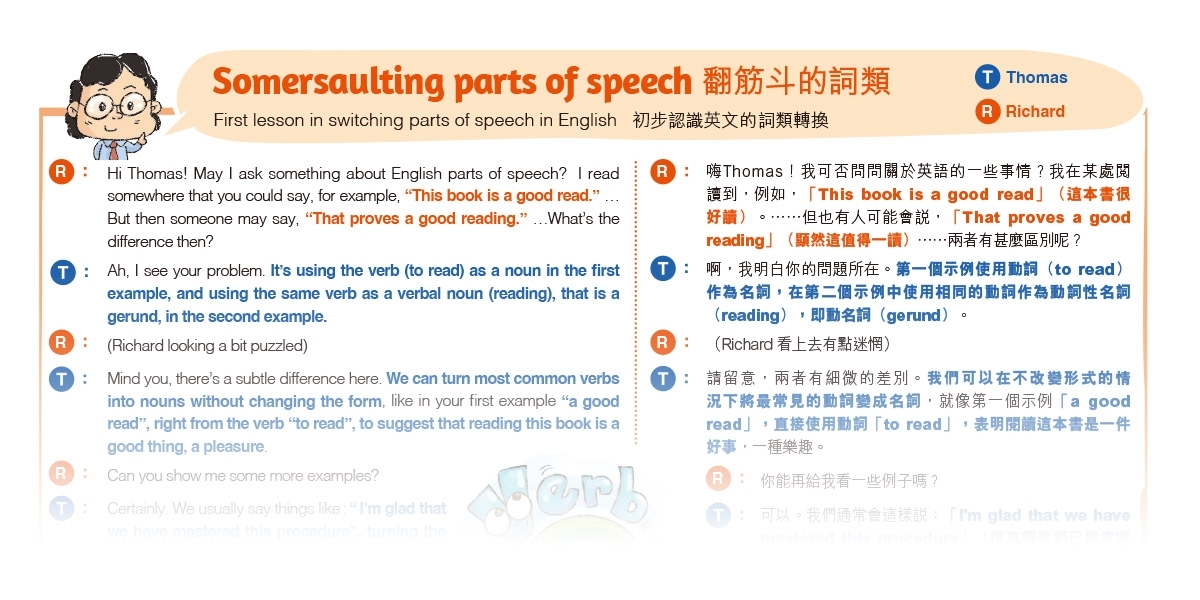昔日文章


Learning English with Thomas
2023.06.18
“ If I were you ” —— This is not the usual past tense
這不是一般的過去式 : if I were you…
Knowing how to use the subjunctive in English 認識假設語氣在英語的運用
T:Thomas S: Sam
S:Good to bump into you here, Thomas! Such coincidence!
T:Hello Sam! Right. So good to see you here in this café.
S:I’ve got a couple of questions about using English tenses that I’ve been wanting to trouble you with.
T:What is your question then? (Thomas taking his first sip)
S:What is the difference between saying, “If I were you” and saying, “If I had been you” ?
T:The difference is the point of time each one refers to. You see, both of such expressions are in what is called the subjunctive mood in English. Saying “If I were you, I would not do that”, for example, refers to now or to a near future time, whereas saying “If I had been you, I would not have done that”, refers to the past.
S:But, why can’t the verb be put just in the simple past tense for the second case?
T:In English you need to make a distinction between things that can actually happen and things that are already “done”, that have already happened. Such actions or events cannot be reverted. That’s why the simple past tense form is used for the subjunctive mood in the first case and the perfect tense form is used for the modal verb in the second case.
S:It’s clear now. (smiling)
S:很高興在這裡碰到你,Thomas!真巧合!
T:哈囉,Sam!很高興在這家咖啡室見到你。
S:我有個關於時態運用(tense)的問題,我一直想請教你。
T:你有甚麼問題呢﹖(Thomas呷第一口咖啡)
S:人們說「If I were you」和「If I had been you」有區別嗎?
T:區別在於說話者所指的時間。你看,這兩種表達方式都是英語中所謂的假設語氣。例如,說「If I were you, I would not do that」(如果我是你,我不會那樣做) 指的是現在或不久的將來,而說「If I had been you, I would not have done that」(如果我是你,我就不會那樣做),指的是過去。
S:但是,為甚麼在第二種情況下動詞不能只用簡單的過去時態呢?
T:在英語中,您需要區分實際可能發生的事情和已經「完成」的事情,已經發生的事情。此類操作或事件無法還原。這就是為甚麼在第一種情況下使用簡單的過去式時態形式來表示假設性的語氣,而在第二種情況下,將完成式時態形式用於情態動詞。
S:現在很清楚了。(微笑)


Learning English with Thomas
2023.06.11
Does “Swimming fool” make sense?
真的喚作「游泳傻瓜」?
Learning how to make proper use of verbs to function as adjectives
學習把動詞的現在分詞作形容詞之用
T:Thomas C:Cynthia
C:The scones were good, right Thomas?
T:Good taste! By the way, what’s the next question?
C:I am always a bit confused about things like “swimming pool” and “swimming fool”?
T:Haha, that’s a funny example. Is that from you?
C:I read it somewhere. I find the two examples seem similar grammatically, but I still feel there is something funny about them.
T:You’re touching on present participles of verbs to function as adjectives.
C:Anyway, Is there some difference between them?
T:“Swimming pool” means the pool is “for swimming”, whereas the phrase “swimming fool” refers to a foolish person who is swimming. This second one is similar to such expressions as “dancing queen”; “winning candidate”; “skating idol”.
C:Hmm…That’s a new usage for me. Thanks so much!
C:Thomas,鬆餅很好吃吧?
T:味道很好。你下一個問題是甚麼?
C:我總是弄不清楚「swimming pool」(游泳池)和「swimming fool」(游泳傻瓜)兩詞?
T:哈哈,這是一個有趣的例子。你怎樣想到?
C:我在某處看到的。我覺得這兩詞在文法上看似相同,不過感覺有點怪怪的。
T:您正在觸及動詞的現在分詞作形容詞。
C:那麼,它們之間有甚麼區別嗎?
T:「Swimming pool」的意思是供 游泳用途的水池,而「swimming fool 」是來形容不擅長游泳的笨蛋。後者的英文表達跟「dancing queen」(跳舞皇后)、「winning candidate」(勝選的候選人); 和「skating idol」(滑冰偶像)類似。
C:嗯⋯⋯這些英語運用對我來說是新的知識。謝謝你!


Learning English with Thomas
2023.06.04
The chameleon game: Ratio to ration to rational to rationale
英文接龍變色龍遊戲
Learning more about word structure and formation in English 進一步了解英語的構詞特色
T : Thomas | C : Cynthia
C: Hi Thomas. Can you show me how to turn any English word around into a new word with a new meaning?
T: Certainly. Take the word “ratio”. Do you know what it means?
C: It’s basic arithmetic. For example, the ratio of any two sides of a square is 1:1, right ?
T: Correct. Now add an “n” to this word “ratio”. What do we get?
C: It’s now “ration”. Meaning?
T: We can say “food rationing”, which was important in war times. Now add “al” to this new word “ration” - and see what we get.
C: Ah, it’s now “rational”, which is what I am, right?
T: (Thomas smiling instead of speaking) … Now add an “e” to this new word and what do we have?
C: It’s “rationale” now.
T: We’re actually on word formation in English. All we need to do is to first of all get a word root ready, and add something to its last letter, in which case it’ll be a suffix. That way, the basic meaning will be modified or even completely changed.
C: Ah, word structure and formation isn’t that complicated as I thought… (Thomas smiling again, instead of speaking)
C: 嗨,Thomas。你能夠告訴我如何將一個英語單詞變成另一含義的新詞嗎?
T: 當然可以。以「ratio」一字為例,你知道它的意思嗎?
C: 這是基本的算術。例如正方形任何兩條邊的比例是 1:1,對嗎?
T: 正確。在「ratio」這個字上添加一個「n」。我們得到了甚麼?
C: 現在是「ration」。意思是?
T: 我們可以說「食物配給」,這在戰爭時期很重要。現在將「al」添加到「ration」後面 - 看看我們得到了甚麼?
C: 啊,現在是「rational」(理性),這就是我,對吧?
T: (Thomas笑而不語)⋯⋯在這個新詞後面加上一個「e」,我們又得出甚麼?
C: 現在是「rationale 」(理由)。
T: 我們剛觸及英語構詞。我們需要做的就是首先準備好一個詞根, 然後在其最後一個字母中添加一些字母,在這種情況下,它就是後綴。這樣,基本含義就會被修正甚至完全改變。
C: 原來英語構詞不是我想像中那麼複雜。(Thomas 再次笑而不語)


Learning English with Thomas
2023.05.25
Somersaulting parts of speech 翻筋斗的詞類
翻筋斗的詞類
First lesson in switching parts of speech in English 初步認識英文的詞類轉換
T:Thomas|R:Richard
R: Hi Thomas! May I ask something about English parts of speech? I read somewhere that you could say, for example, “This book is a good read.” … But then someone may say, “That proves a good reading.” …What’s the difference then?
T: Ah, I see your problem. It’s using the verb (to read) as a noun in the first example, and using the same verb as a verbal noun (reading), that is a gerund, in the second example.
R: (Richard looking a bit puzzled)
T: Mind you, there’s a subtle difference here. We can turn most common verbs into nouns without changing the form, like in your first example “a good read”, right from the verb “to read”, to suggest that reading this book is a good thing, a pleasure.
R: Can you show me some more examples?
T: Certainly. We usually say things like : “ I’m glad that we have mastered this procedure”, turning the noun into a verb again, or “Can I give you a lift in my car”, turning the verb “to lift” into a noun, meaning a free ride. This is called “somersaulting parts of speech”, and people say it was “invented” by Shakespeare!
R: That’s really eye-opening.
R: 嗨Thomas!我可否問問關於英語的一些事情?我在某處閱讀到,例如,「This book is a good read」(這本書很好讀)。……但也有人可能會說,「That proves a good reading」(顯然這值得一讀)……兩者有甚麼區別呢?
T: 啊,我明白你的問題所在。第一個示例使用動詞(to read) 作為名詞,在第二個示例中使用相同的動詞作為動詞性名詞(reading),即動名詞(gerund)。
R:(Richard 看上去有點迷惘)
T: 請留意,兩者有細微的差別。我們可以在不改變形式的情況下將最常見的動詞變成名詞,就像第一個示例「a good read」,直接使用動詞「to read」,表明閱讀這本書是一件好事,一種樂趣。
R: 你能再給我看一些例子嗎?
T: 可以。我們通常會這樣說:「I'm glad that we have mastered this procedure」(很高興我們已經掌握了這個程序),再次將名詞變成動詞,或者「Can I give you a lift in my car」(我可以開車送你一程嗎?),將動詞「to lift」變成名詞,意思是順道送你一程。在英文文法,這稱為「somersaulting」,據說由是莎士比亞發明的!
R: 這真是令人大開眼界。






